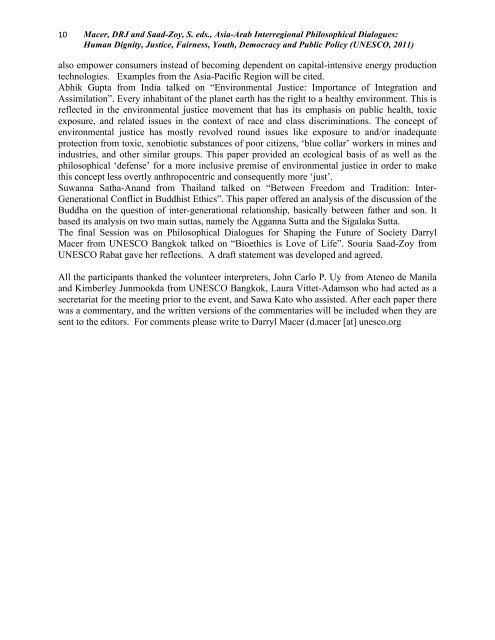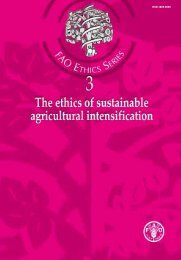Human Dignity, Justice, Fairness, Youth - Eubios Ethics Institute
Human Dignity, Justice, Fairness, Youth - Eubios Ethics Institute
Human Dignity, Justice, Fairness, Youth - Eubios Ethics Institute
You also want an ePaper? Increase the reach of your titles
YUMPU automatically turns print PDFs into web optimized ePapers that Google loves.
10 <br />
Macer, DRJ and Saad-Zoy, S. eds., Asia-Arab Interregional Philosophical Dialogues:<br />
<strong>Human</strong> <strong>Dignity</strong>, <strong>Justice</strong>, <strong>Fairness</strong>, <strong>Youth</strong>, Democracy and Public Policy (UNESCO, 2011)<br />
also empower consumers instead of becoming dependent on capital-intensive energy production<br />
technologies. Examples from the Asia-Pacific Region will be cited.<br />
Abhik Gupta from India talked on “Environmental <strong>Justice</strong>: Importance of Integration and<br />
Assimilation”. Every inhabitant of the planet earth has the right to a healthy environment. This is<br />
reflected in the environmental justice movement that has its emphasis on public health, toxic<br />
exposure, and related issues in the context of race and class discriminations. The concept of<br />
environmental justice has mostly revolved round issues like exposure to and/or inadequate<br />
protection from toxic, xenobiotic substances of poor citizens, ‘blue collar’ workers in mines and<br />
industries, and other similar groups. This paper provided an ecological basis of as well as the<br />
philosophical ‘defense’ for a more inclusive premise of environmental justice in order to make<br />
this concept less overtly anthropocentric and consequently more ‘just’.<br />
Suwanna Satha-Anand from Thailand talked on “Between Freedom and Tradition: Inter-<br />
Generational Conflict in Buddhist <strong>Ethics</strong>”. This paper offered an analysis of the discussion of the<br />
Buddha on the question of inter-generational relationship, basically between father and son. It<br />
based its analysis on two main suttas, namely the Agganna Sutta and the Sigalaka Sutta.<br />
The final Session was on Philosophical Dialogues for Shaping the Future of Society Darryl<br />
Macer from UNESCO Bangkok talked on “Bioethics is Love of Life”. Souria Saad-Zoy from<br />
UNESCO Rabat gave her reflections. A draft statement was developed and agreed.<br />
All the participants thanked the volunteer interpreters, John Carlo P. Uy from Ateneo de Manila<br />
and Kimberley Junmookda from UNESCO Bangkok, Laura Vittet-Adamson who had acted as a<br />
secretariat for the meeting prior to the event, and Sawa Kato who assisted. After each paper there<br />
was a commentary, and the written versions of the commentaries will be included when they are<br />
sent to the editors. For comments please write to Darryl Macer (d.macer [at] unesco.org

















